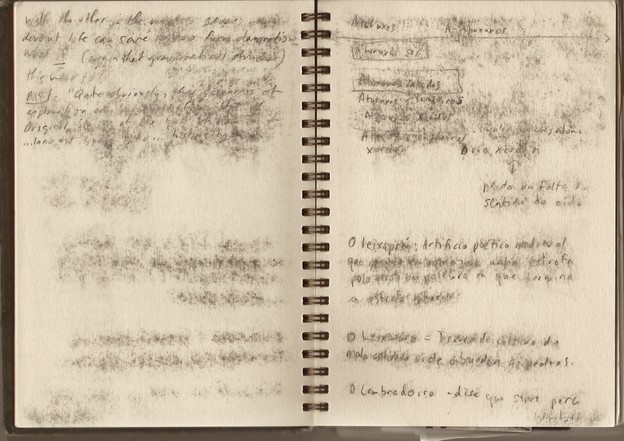Translation as facticity
(Curiosity and melancholy too)

“There is a certain curiosity in it that exceeds melancholy.” I took this quote out of a notebook of mine, my “Praha” Moleskine that has never seen Prague, for I translate a “Praha” out of wherever I am, going to Prague by simply writing always in the pages of Praha, even when I am elsewhere, knitting these elsewheres together into Prague or Praha. At times I even take out the map of the city and use it to find where I am, though I am nowhere near Prague.
What does Prague and a notebook I bought on The Danforth in Toronto (a reject)—and have no right to use—have to do with translation, you ask? Perhaps all translation has to do with curiosity and melancholy, I respond.
I open the notebook two pages further on and find a quote from Giorgio Agamben scribbled there, from page 340 of his Puissance de la pensée: “La facticité est la condition de ce qui demeure caché dans son ouverture, de ce qui est exposé par son retrait même.”
“Facticity is the condition of that which remains concealed in its opening, of that which is exposed by its very retreat.”
I look up Agamben’s book in English, excited. It is called Potentialities (which is the “power of thinking,” of course, I nod)… and Agamben is talking on page 185 about Heidegger’s concept of facticity, which is not factual, but returns to the sense of fact as facere, as making, and thus as non-original. Agamben beckons past Husserl, he says, to Augustine, who was caught saying “the soul is made”.
“In some ways, ‘irreducible opacity’. In some ways, ‘the incommensurate.’” “A constellation charged with tensions.” “Refusal.” “The labour of poetry.” And “the face.” (All from Praha, at random.)
This facticity, in Augustine and in Agamben, via Heidegger, is set in opposition to nativity, the native. Ah, now you know why I am writing this. What is translated has no nativity, is language with no native tongue. Thus it is factual. A made thing. Like a soul.
Suddenly, I think, too: “Robert Duncan” and remember working as a youngster as a dishwasher on a train and shouting into the wilderness near Prince Rupert, BC the words to a Duncan poem:
“that is not mine, but is a made place
that is mine, it is so near to the heart.”
T r a n s l a t i o n ' s__H o m e o p a t h i c__G e s t u r e s